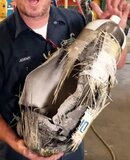Wookie
Proud to be a Chaos Muppet
Staff member
ScubaBoard Business Sponsor
ScubaBoard Supporter
Scuba Instructor
Carbon fiber scuba cylinders don't get hydro'd either. 15 years and down the road they go.
Welcome to ScubaBoard, the world's largest scuba diving community. Registration is not required to read the forums, but we encourage you to join. Joining has its benefits and enables you to participate in the discussions.
Benefits of registering include
As far as the Military, they require DOT and UW designation for all tanks that can be filled by civilian facilities.
Carbon fiber scuba cylinders don't get hydro'd either. 15 years and down the road they go.

I don't doubt you, however I did find the fol;lowing which leads me to suspect that they should still be hydro'd periodically but do have a finite life of 15 years
I've been wrong before. Thanks for the education.I don't doubt you, however I did find the fol;lowing which leads me to suspect that they should still be hydro'd periodically but do have a finite life of 15 years
appreciate this website has info on SCBA Cylinders. This is another website again quoting hydro times on SCBA
- Hoop-wrapped cylinders should be tested every three years and have a 15-year service life.
- Fully-wrapped fiberglass cylinders should be tested every three years and have a 15-year service life.
- Fully-wrapped Kevlar® cylinders should be tested every three years and have a 15-year service life.
- Fully-wrapped carbon fiber cylinders should be tested every five years and have a 15-year service life.
Now I'm no expert (well apart from NDT/NDE of carbon and metallic components) but I figure that if you're going to take pressurised cylinders into water you'll want to inspect them
Anyone interested in the Corrosion aspects
Galvanic Corrosion of Metals Connected to Carbon Fiber Reinforced Polymers of CFC
View attachment 436241
Depends on tank and country then, but carbondive claims no limit (except if 200 years is a limit to you)
I hope you didn't think I was calling you out, It wasn't meant that way.I've been wrong before. Thanks for the education.
Your absolutely right regarding the tank and cylinder comment. As you are aware the civilian base dive industry seem to enjoy its generalization. To be quite blunt having a discussion about anything technical especially terminology seem to only invite a variety of internet trolls. Before you know what happen the issue is language not the actually subject matter.First, thanks for your reply! But it seems my wry sense at humour went right over your head. ;-) That is, I once had an Oz CCR Instructor who was an ex Mk16 EOD guy / Military instructor on same. If he heard you call a scuba 'cylinder' a tank he would reply that only the army (or Marines, whatever) used 'tanks' (as in Sherman, Panzer, M1 Abrams, etc) and a penalty of "drop and give me twenty" would be enjoyed as punishment for using the ground pounder term, when in fact it was 'cylinders' that we were / you are using. (Yes semantics maybe, but.............) And this 'term correction" was kept in force until one stoped using said term, which one soon did. Hence my wry comment / 'advice' in the post you quote of mine. ;-)
Anyway back to the cylinders. Now while I think the rest of what you say is somewhat superfluous to the accident itself, if what you say is correct, and I am not doubting you, but am not hands on 'famliiar' with the unit in question, then if 3L cylinders were what the CCR manufacturer supplied / reccomended for that unit,, and the deceased was only using 2L's instead, well I see a potential problem right there unfortnately, as it could be argued that if 3L's were being used then the O2 supply would not have been exhausted. But I don't have a dog in this kerfufle whatsoever, it is simple arithmetic is all.
You are very well aware that those spheres do not have stamps. Lets just refer to your tag line.Please do not let the facts of the matter interfere with my discourse on the subject.I'd love to see the DOT stamp or UW designation for an inconel sphere or even a steel sphere used in a Mk 15 or 16.
I think the OP is making it up.

